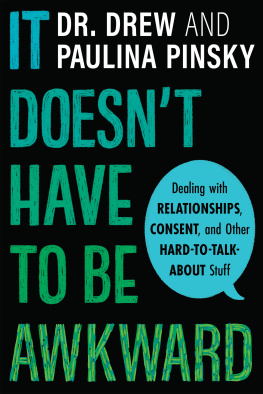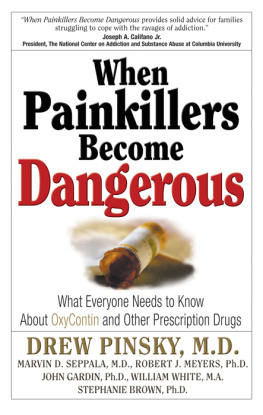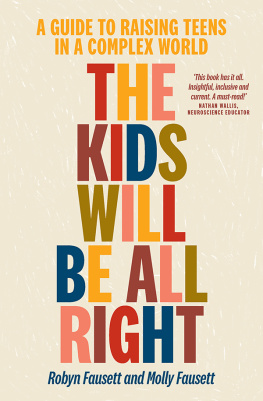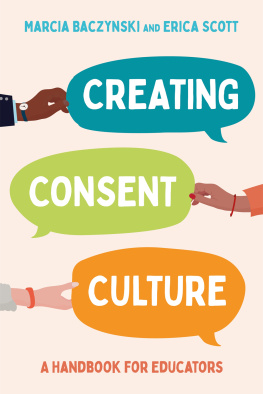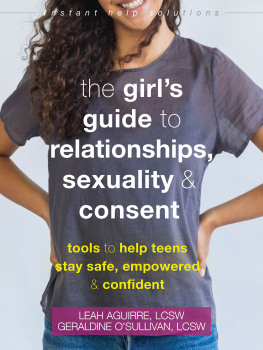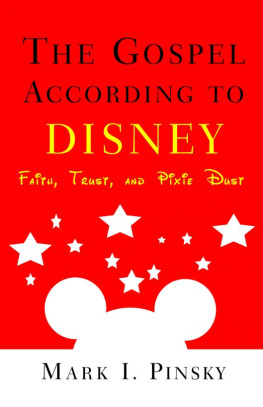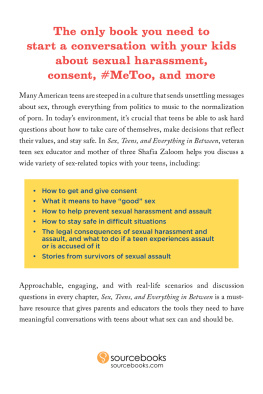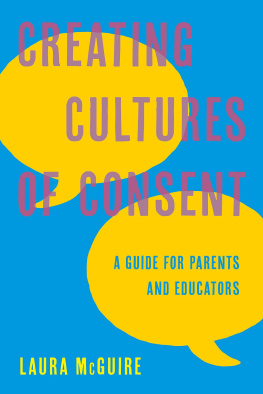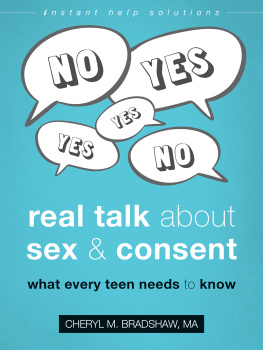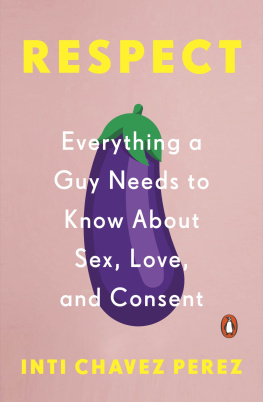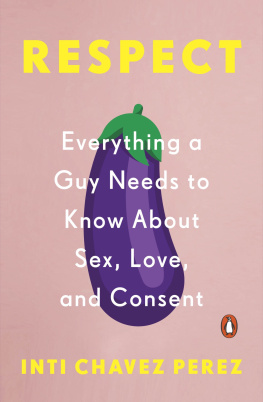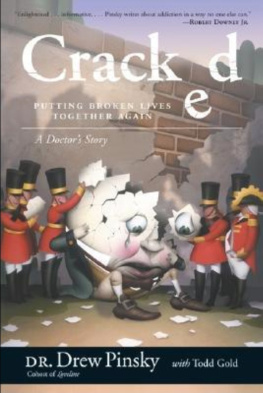Copyright 2021 by Drew Pinsky and Paulina Pinsky
All rights reserved. For information about permission to reproduce selections from this book, write to or to Permissions, Houghton Mifflin Harcourt Publishing Company, 3 Park Avenue, 19th Floor, New York, New York 10016.
hmhbooks.com
Hand-lettering and illustrations by Ellen Duda
Cover lettering and design 2021 by Ellen Duda
The Library of Congress Cataloging-in-Publication Data is on file.
ISBN: 978-0-358-39603-1
eISBN 978-0-358-39600-0
v1.0821
TO THOSE WHO WANT TO SPEAK UP BUT DONT KNOW HOW
Father/Daughter Team:
Get to Know Us

This is a book about relationships, so its only fair that you know the people youre getting into this with: Im Dr. Drew, and Ive been talking about sex with teenagers for a long timesince I was twenty-four and in med school. I had a popular radio show where I answered questions from teens and twenty-somethings who wanted information about sex and relationships. Some of their questions were about basic and important health questions and, as a doctor, I had the answers they were looking for.
But many of their other questions were more complex. They wanted to know about sexuality, and attraction, and whether what they were doingor wanted to dowas right or wrong, or normal or weird. To be fair, there were a whole bunch of confusing messages at the time. In the eighties, sex ed or health class in high schools usually focused on what was called sexual literacy. The point was to just teach kids about the mechanics of their own bodies and (hetero)sexual relationships. My goal was to go beyond the basic biology and let people know they could ask me anything without feeling embarrassed.
And while I was talking to other kids about sex... I also had kids (triplets!) of my own. Naturally, I was confident I could give my kids the facts they needed to know about sex. By the time they were teens, I had learned that our most important conversations were about so much more. There is no doubt it was sometimes awkward (for everyone involved) to talk about the mechanics of sex, but it wasnt so hard to talk about how to have healthy, meaningful relationships (with all kinds of people, not just sexual partners). My kids are adults now, and Im hoping that what Ive learned can help you think more deeply about these topics, and offer some perspectivesbacked by studies, science, and over thirty-five years of experiencethat you may not have considered. But Im not heading into this conversation with you alone. Im bringing along one of my kids: my daughter, Paulina. Shes a millennial, a writer, a comedian, and a feminist. Shell keep it real when I start to geek out on theory, and together well do our best to help you navigate the complex, confusing, and completely natural questions you have around sex, consent, and relationships of all kinds.
Oh, yeah. Dads not kidding when he says it could be awkward. I remember when my parents first talked to me and my brothers about the birds and the bees. The five of us were all seated at one end of the mahogany dining table that is only used during holidays in my parents home in Pasadena, California. I was in the fifth grade. The use of the formal dining table alerted me to the fact that the night was special, but I was ultimately unsuspecting. A pink plush version of a sexually transmitted infection (STI), syphilis, lay on the table and stared back at me with its phony sewn-on eyes. Dad had been given the toy as a promotion of some sort at KROQ, the radio station he worked at, and he thought it could be a nice little prop for our conversation.
Dad broke the news: We are going to talk about se As soon as I heard what was about to happen, I covered my ears and shouted, LA! LA! LA! School already told us about this! I stood up and threw the stuffed STI onto the floor before running out of the room. My brothers were very confused and remained seated because they are better behaved than I am. Lucky for me, I went to a school that knew that sex ed was essential to my development. And wow, has that knowledge come in handy!
Okay, the sex talk must have been equally traumatic for me because I dont remember that conversation at all. What I do remember is one time driving in the car with Paulina and her brothers. They were probably in third or fourth grade. For some reason I was sitting in the back with the boys; Paulina was sitting in the front with her mother when she just burst out with All rightcan somebody please tell me whats the deal with this whole penis/vagina thing? My wife shot me a glance in the rearview mirror and I started right in, saying, Okay. Ill explain the whole deal. Just tell me when you want me to stop. I started to describe intercourse, but within about twenty-two seconds, the boys were cracking up and Paulina was screaming, STOP! Maybe thats why I thought props would help the next time I was bringing up the topic.
So here we are: Ive spent decades listening to people ask and talk about sex and relationships and coaching them to find solutions. Im as old (or older!) than your parents, and even though I talked with my own teenagers about their relationships, I can understand if you think that I couldnt possibly get what you want to know about. Maybe you feel like your world and concerns are invisible to adults. And when I listen to people your age, I hear that you have questions and challenges around your relationships today that I couldnt imagine when I first started giving advice. But the answers to navigating these issues are grounded in proven scienceand evolving theoryabout why people behave the way they do.
This is bound to be a complicated conversation. Know that Im here to hold your hand. Remember, Im not much older than you are and Im having this conversation with my dad. I dont know your relationship to your parents, but know this: I am not easily embarrassed, I want my dad to be proud of the work I do, and Im not afraid of difficult conversations. No matter where you come from, what your parents think, or what other people think about you: we are in this together.
... AND LEARN WHY WE WROTE THIS BOOK
When I was in college, Emma Sulkowicz was carrying her mattress around Columbia Universitys campus, where we both went to school. You might be too young to remember her performance art, but I saw it firsthand. The first time I saw her, she was alone, carrying her striped twin-XL mattress, dragging it across College Walk. I was confused. Why was she carrying it? Wasnt it heavy? Why wasnt anyone helping her?
But then someone told me: she was carrying her mattress until her rapist was found guilty.
The next time I saw her, five people were helping her carry it over their heads. I wanted to help, but there were already too many hands. She brought that mattress to every class. She carried it across the stage at graduation. The university did not give her a reason to leave it in her dorm. The student she had accused of rape remained on campus. Her charges against him were investigated by the university and dismissed. Their reasoning: How could sex that started out as consensual become nonconsensual?
And thats part of the reason this book exists.
When I attended graduate school at Columbia, I was required to do sexual harassment training. It was clinical and legal, and it was easy to skip through. It felt like a way for the institution to protect itself, rather than a way to protect its students.
This confusion about consent was compounded by my dating experience in my early twenties. I was Tindering a lot. On the app itself, I felt objectified and harassed by random people I did not know. If I did make it to a date, I sometimes found myself having sex just because it was easier to have sex than to say no. The sex was unfulfilling. I was left feeling empty and confused. I was exercising my sexuality, but I felt used, unappreciated, and unseen.

